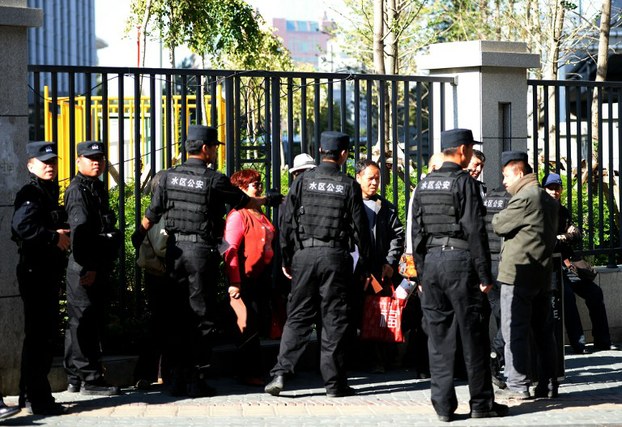China: Increase in criminal trials in Xinjiang indicates growing repression: Rights journal
| Publisher | Radio Free Asia |
| Publication Date | 11 March 2015 |
| Cite as | Radio Free Asia, China: Increase in criminal trials in Xinjiang indicates growing repression: Rights journal, 11 March 2015, available at: https://www.refworld.org/docid/552e197453.html [accessed 26 May 2023] |
| Disclaimer | This is not a UNHCR publication. UNHCR is not responsible for, nor does it necessarily endorse, its content. Any views expressed are solely those of the author or publisher and do not necessarily reflect those of UNHCR, the United Nations or its Member States. |
2015-03-11
By Roseanne Gerin
 Chinese police ask a group of people who were denied entry to the Urumqi Intermediate People's court to leave as the trial of Ilham Tohti begins in Urumqi, Sept. 17, 2014. AFP
Chinese police ask a group of people who were denied entry to the Urumqi Intermediate People's court to leave as the trial of Ilham Tohti begins in Urumqi, Sept. 17, 2014. AFP
A significant increase in the number of overall criminal trials in northwest China's restive Xinjiang region indicates that authorities have intensified the suppression of human rights activism and dissent, a law and human rights journal has reported.
The Dui Hua human rights journal, which reports on current issues in China's criminal justice system, analyzed official court statistics that showed the number of criminal trials held in Xinjiang rose more than 40 percent to more than 29,500 last year compared to the number of criminal trials in 2013.
The increase in trials for crimes such as endangering public security, disrupting social market economic order, infringing on citizens' personal and democratic rights, obstructing social administrative order and embezzlement and bribery came as the number of trials for charges of endangering state security remained flat in 2014 compared to the previous year.
The number of trials for obstructing social administrative order doubled to more than 4,500 in 2014, the report said, noting that authorities use this category to target unauthorized Islamic and Christian groups. It also covers the distribution of religious materials as well as assemblies and demonstrations.
The number of trials for infringing upon citizens' personal and democratic rights nearly doubled to 7,500 last year, the report said. This category includes inciting racial hatred and ethnic discrimination, which authorities use to charge those who disseminate information that "tarnishes" China's ethnic harmony. For Uyghurs, this means that those who challenge government bans on beards, veils and religious observances can face criminal penalties.
Right groups examine such figures for telltale signs that the Chinese judicial system discriminates against Uyghurs, the Muslim and Turkic-speaking ethnic minority people who live in Xinjiang.
The article noted that the Xinjiang's high court's annual work report, and Dui Hua's estimates issued last year, indicated that about 300 Endangering state security (ESS) trials had been held in the region in each year from 2010 to 2014.
ESS trials "can be used as a proxy for the suppression of human rights activism since several of the crimes in the ESS category are constituted by certain kinds of speech and association," the article said.
Xinjiang usually accounts for the highest number of such trials in China, the report said, although it noted that official data had yet to be released showing whether the number of ESS trials grew last year.
A dozen convicted
In 2014, about a dozen people were convicted of endangering state security last year in Xinjiang, according to Dui Hua's political prisoner database, including Uyghur scholar Ilham Tohti.
The former economics professor at the Central University for Nationalities in Beijing was sentenced in September to life in prison, along with deprivation of political rights and confiscation of all his assets. Two months later, a high people's court rejected his appeal against his sentence.
Seven of Tohti's students were convicted last year on similar charges for their involvement in the operation of a Uyghur news website and received sentences of three to seven years.
Tohti has repeatedly denied the charges and said the cases against him and his students were politically motivated.
The Dui Hua report went on to note that the number of indictments for endangering state security in 2013 showed strong growth with 32 percent more individuals indicted in 57 percent more cases.
In the last few years, Xinjiang has seen an upsurge in violence that has left hundreds dead and which China has blamed on terrorists and Islamist insurgents seeking to establish an independent state called East Turkestan.
Under Chinese President Xi Jinping, Chinese authorities have conducted an antiterrorist campaign throughout Xinjiang, including police raids on Uyghur households, restrictions on Islamic practices, and curbs on the culture and language of the Uyghur people.
Link to original story on RFA website
